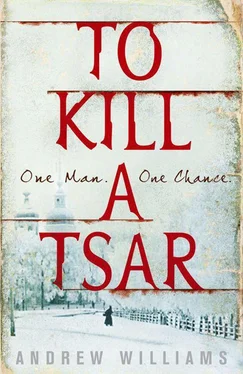Tarakanov was waiting for him on the first floor landing, an anxious expression on his chubby face.
‘I saw you in the street,’ he said. ‘Come in, come in quickly.’
Councillor Tarakanov was as timid as a hare. The small circle who knew of his role in the movement had given him the code name ‘Bucephalus’, after Alexander the Great’s highly strung horse. Time in his company passed slowly, but in extremis there was no safer place in Petersburg. He was the most trusted of the movement’s ‘Ukrivateli’ — concealers — for he was the last person the authorities would suspect of revolutionary sympathies. Short, fat, fastidious, he was also a councillor at the Ministry of Interior and a social snob.
‘Did anyone see you at the door?’ he asked, stepping over to the window.
‘Of course not,’ replied Mikhailov.
‘You know the lodger downstairs, a nosy old crone with great staring eyes, she’s a milliner, I think, she always looks at me strangely when I meet her. She’s a spy, I am sure of it.’
Mikhailov rolled his eyes by way of a reply.
‘You don’t know the risk I am taking,’ said Tarakanov petulantly.
‘I do, I do, believe me. You’re a good chap. And I won’t be here long, now come away from the window before someone sees you.’
But Mikhailov’s pursuers had given up the chase. Collegiate Councillor Dobrshinsky was listening to their report in the investigation office at Fontanka 16, a map of the city open in front of him. The other agents were bent low over their desks in an effort to avoid catching his eye.
‘He knew his way through the building, Your Honour.’ Agent Myshkin shifted his weight to the other foot, his hands clasped awkwardly in front of him. His companion — Zadytsev — looked just as uncomfortable.
‘He must have known he could lock the door and slip out to the lane at the front.’
‘Show me.’
Dobrshinsky followed the agent’s finger as he traced the route they had taken from the Haymarket. When he had finished the collegiate councillor sat back and stared at them coldly.
‘You made yourselves conspicuous,’ he said at last. ‘What use are you to the investigation if you can’t follow a suspect without giving yourselves away?’
‘He kept stopping, Your Honour… He knew what he was doing.’
‘That’s enough,’ said Dobrshinsky. ‘I don’t want excuses. Redeem yourselves. I want you to question every porter and yard keeper in the area.’ He tapped the map with his fingers. ‘Take the local gendarmes with you. And begin with the house where he gave you the slip. I want to know who is helping Mikhailov.’
‘Now, Your Honour?’ asked Myshkin tentatively.
‘Yes. Now. At once,’ said Dobrshinsky, rising abruptly from the desk. ‘What are you waiting for?’
He watched them scuttle out of the office, then turned to one of the clerks. ‘Do we have the report on the dead informer?’
The clerk opened a file on his desk, took out a single sheet of paper and handed it to him.
‘It took only a few seconds for Dobrshinsky to glance through the report. Just the bare bones. Body in a Peski street. Stab wound to the chest. A vagrant by the name of Viktor who used to keep his eyes and ears open for kopeks. He had given them the student Popov. The dvornik at a local school had found the vagrant’s body on the doorstep. Murdered before he had a chance to give them anything more.
‘Why are we always left with a corpse?’ he muttered under his breath.
Alexander Mikhailov knew it was wise not to presume too often or for too long on Bucephalus’s hospitality. Besides, there was an appointment he had to keep. And so, after an hour spent sipping tea in the comfort and security of the councillor’s drawing room, he made his way by a back stair to a door that opened on to the courtyard behind the mansion. It was nearly eight o’clock, and to avoid being recognised in the empty Sunday streets he hailed a cab with a canopy and directed its driver to take him across the Fontanka. The short journey took Mikhailov along the embankment past the Third Section’s headquarters and he could not resist leaning forward to glance at it as the cab swept past. He was the sort of revolutionary popular writers like Dostoevsky branded a ‘fanatic’ because he dedicated his life to the cause but he was not anxious to be hauled down the steps into the basement cells at Number 16. Stay one step ahead of your enemies, he told his comrades — and with the help of the man he called ‘the Director’ he would do.
The cab driver turned right off Fontanka into one of the handsome little streets opposite the Summer Garden. Mikhailov paid without a word and with just enough of a tip to be unmemorable. He appeared for all the world, if the world was watching, an unassuming young gentleman, modestly dressed in a light brown summer suit, perhaps a civil servant returning home after a day in the country. He walked at an unhurried pace, saluting a young couple who made way for him to pass on the pavement. At the bottom he stopped and, pretending to check the time, cast a look back down the street. Satisfied, he turned right on to Solianoy Lane and strolled down to the handsome little red and white church on the corner.
The last public service of the day had ended some time ago but the air was heavy with the sweet smell of incense. The church was empty but for an old lady nodding and clicking her rosary beads before the icon of St Panteleimon. Mikhailov paid for a votive candle, lit it and pressed it into one of the iron banks before the iconstasis, then, hands clasped, he muttered a meaningless prayer to a god he did not believe in any more. The flickering light of the candles seemed to breathe life into the grim painted faces of the patriarchs gazing down on him from the pillars and walls. Revolutionaries too, he thought with a smile, recalling the English doctor’s description of Christ as a ‘socialist’. Memories of childhood, his mother holding his hand, the rumble of the cantor, the silver framed icon held aloft by the priest, shimmering in the candlelight — he could feel the pull of that old religious order still. What was it Karl Marx had called it? — das Opium des Volkes — but not in a disparaging way. Ordinary people were not going to give up their belief in God and heaven until the world changed for the better and it was no longer necessary to turn to faith for the comfort of hope and forgetting.
‘Please God, where is the Director?’ he whispered under his breath. For how long was he going to have to keep up this pretence of piety? His sacrilegious prayer was answered, for he heard a footstep and was conscious of someone at his shoulder.
The ‘Director’ stepped forward and pressed his own candle into the stand then crossed himself several times.
‘You’re late, Alexander,’ he said at last. ‘I was worried.’
‘A little trouble,’ Mikhailov replied. ‘Nothing that need concern you.’
He led the way to a bench half hidden behind a curtain and in deep shadow at the back of the church. The man who slumped round-shouldered beside him was in his late twenties, thin and rather pasty. He had a long solemn face and a badly trimmed beard, a beetle brow and large brown intelligent eyes, enormous when glimpsed through the lenses of his spectacles. His clothes and general demeanour suggested an industrious but downtrodden junior clerk. ‘The body of the spy was found in the street outside the school in Peski,’ he said. ‘A report has been made by the local station.’
‘Do you know how he found Popov?’
The Director shrugged: ‘A chance to make a little money for vodka. He’d worked for the police for a while. Saw Popov at the Baird Works and followed him. But there’s something else…’ He edged a little closer. ‘Dobrshinsky’s going to bring in a woman called Volkonsky for questioning. ’
Читать дальше












